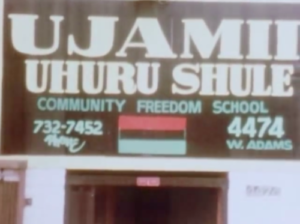AMIS
A Screening and Conversation with filmmaker Don Amis as part of THE COMBATIVE PHASE
Sunday, June 25, 3pm at Yale Union
UJAMII UHURU SCHULE [Community Freedom School]
Dir: Don Amis, 1974, 16mm transferred to digital video, 9 min.
OPERATION BOOTSTRAP
Dir: Charles and Altina Carey, 1968, 16mm, 58 min.
Don Amis moved to Los Angeles in 1968, with the specific intention to work with Operation Bootstrap, a social program operating from an unused warehouse at the corner of 42nd Street and Central Avenue in South East Los Angeles. Founded two months after the Watts Rebellion, Bootstrap was initiated by Lou Smith and Robert Hall, two previously active members of the Congress of Racial Equality (CORE) who became disillusioned with the organization’s lack of presence in and direct support for the black communities of Los Angeles.
In the neighborhood of Avalon, where Bootstrap was located, 35% of families were living below the poverty line established by the Social Security Administration. Rebooting the Watts slogan “burn, baby, burn” as the motto “learn, baby, learn,” Bootstrap centered on the provision of communication and job training programs by volunteer teachers, and quickly gained a level of momentum with support from both liberal and conservative ends of the political spectrum. It also became an established space for debate between radical black activists and white liberals that pushed beyond civil rights based notions of equality, into the confrontation of structural racism.
In 1969, Amis entered UCLA in the High Potential Program, and the following year applied to the film program after taking an undergraduate cinematography class. Distinct from many of his African American colleagues at UCLA, who have latterly been grouped under the moniker “the L.A. Rebellion” and who predominantly worked in narrative film, Amis focused on a documentary approach to filmmaking. Rather than adopt film as a mode of personal expression, he saw the need to engage directly with acts of social change, seeking to reflect “the rebellion going on in society.”
Amis’s UCLA “Project One” film Ujamii Uhuru Schule [Community Freedom School] is a portrait of an Afrocentric primary school in South Los Angeles. In the face of persistent segregation and discriminatory school conditions, the Freedom School movement emerged around the U.S. in the early 1960s with curricula that focused on the social, political, and economic context of existing race relations and the Civil Rights Movement, alongside traditional classes. In Amis’s depiction of Ujamii Uhuru Schule (Swahili for Community Freedom School) the school’s teaching of the importance of cultural values and self-defense, under the banner of the Pan-African flag, highlights a shift in the early ’70s toward the cultural and political autonomy sought through the black power movement.
